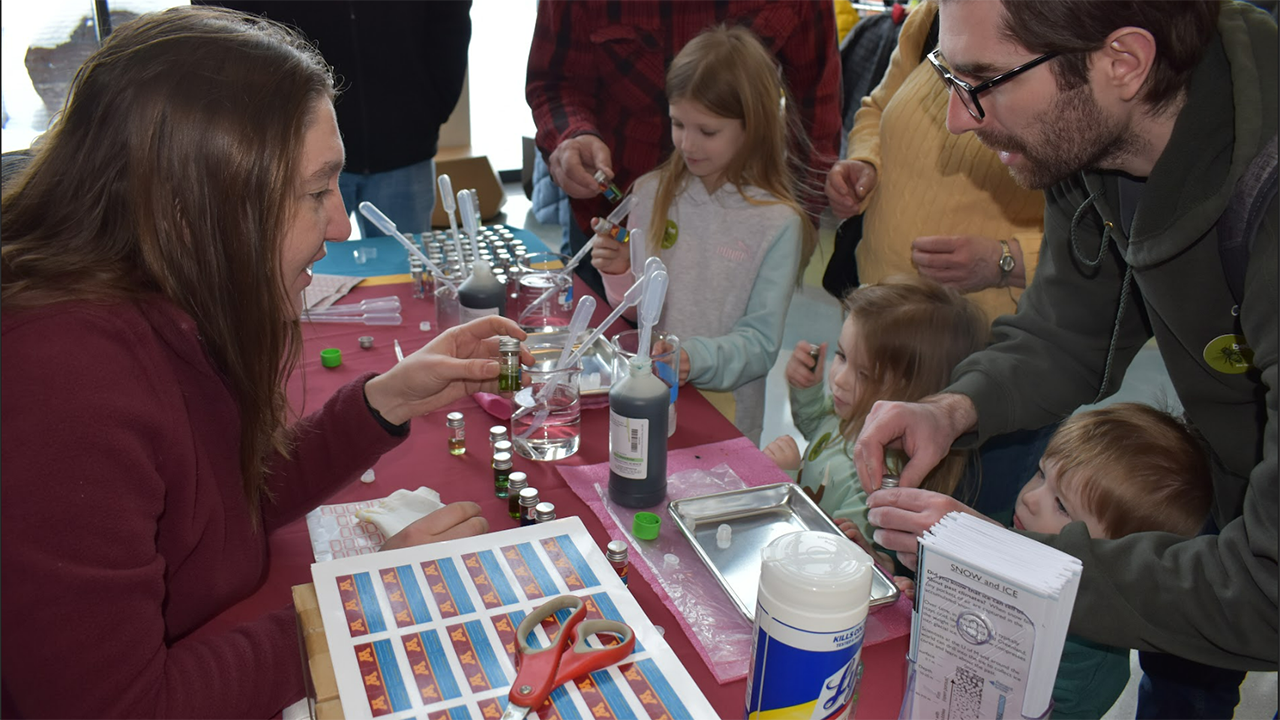
MCAP experiment station at The Bell Museum explains how carbon dioxide interacts in the atmosphere.
Climate science is important – so is the need to make it actionable and useful to communities at large, which is the driving force behind the University of Minnesota Climate Adaptation Partnership (MCAP). A research and Extension center, MCAP works at the interface of community and climate science, with a goal of co-creating knowledge about effective responses to climate change to ensure resiliency for the future, according to Heidi Roop, director of MCAP.
“We want to partner across Minnesota’s complex and evolving landscape to help people think about their unique climate risks and consider the many places where climate science can and should be used,” said Roop. “We’re invested in generating rigorous and applied science, but its application and usability comes down to so much more than just the science. It's about partnerships, communication, creativity, and sustained, authentic engagement. We also have to understand what knowledge is most needed and relevant to communities across the state.”
MCAP operates as a collaboration of students, postdocs, Extension educators, and faculty across the University of Minnesota system who generate new data and insights about climate change, its impacts, and effective climate responses. The team also actively supports the application and use of this knowledge to help communities, state and federal agencies, tribes, and other stakeholders effectively manage these risks–today and in the future.
For example, MCAP is leading a state-funded effort in partnership with the Department of Commerce to model Minnesota’s future climate as part of the Agricultural Weather Study project. This project is downscaling global climate models to local levels, which will allow the MCAP team to generate projections of future climate that directly factor in Minnesota’s unique climate context, including the state’s numerous lakes. This new data will be made available at a scale of three-mile squares through the end of the century. MCAP is also collaborating with U-Spatial to visualize the data in an interactive online tool. Extension educators on the MCAP team are using this data and the tool to provide dedicated training on effective climate risk management for individuals and practitioners across different sectors, from agriculture, forestry, and natural resources to the built environment.
This data is also critical for informing and guiding deep discussions about what climate risks Minnesotans need to anticipate and manage over the long term. For example, MCAP teamed up with Short Elliott Hendrickson Inc. on a project in Duluth that used climate model output to guide stormwater infrastructure design. The team is also using these models to project future groundwater change and crop water availability across Minnesota. This data is also informing an updated climate adaptation plan for the 1854 Treaty Authority and the Bois Forte, Grand Portage, and Fond du Lac Bands. On the industry side, MCAP is using this data to help architects and engineers incorporate future climate change information in adaptive design decisions.
This work is also directing a new partnership with the Minnesota Corn Growers Association, who heard about the project and wanted to make it useful for the agricultural sector. Funding from the association and the State of Minnesota resulted in the creation of a new extension educator position focused on climate, resilience, and agriculture with the goal of providing training around information directly useful to farmers.
Roop hopes that this proof-of-concept position sponsored by the Minnesota Corn Growers Association, along with another newly created Extension educator position within the forestry and natural resources sectors, will support the development of dozens of other sector-specific climate resilience Extension educator positions across the state. Through this expansion, MCAP could install dedicated climate and climate adaptation expertise and capacity across the landscape to help accelerate Minnesota’s climate resilience and preparedness efforts and investments.
“As an organization, we’re trying to develop and grow and make sure we are supporting, providing, and hiring the right expertise while also training the next generation of leaders so that they have the skills to really turn science into action at this critical time for society,” said Roop.
Roop’s forthcoming book, The Climate Action Handbook, was also designed to be turned into an Extension program called Community Climate Leaders. She hopes to educate cohorts of community members across the state who want to develop their own climate solutions journeys and catalyze local climate action across the state.
“This book and program are about how we all have different capacities to contribute to climate solutions. Not all of us can put solar panels on our roofs or buy electric vehicles. It can be a very othering space. But this book and program aim to open the door and invite everyone in and showcase the many ways we can all engage in climate solutions and accelerate climate action as individuals, in our communities, and as a broader collective.”